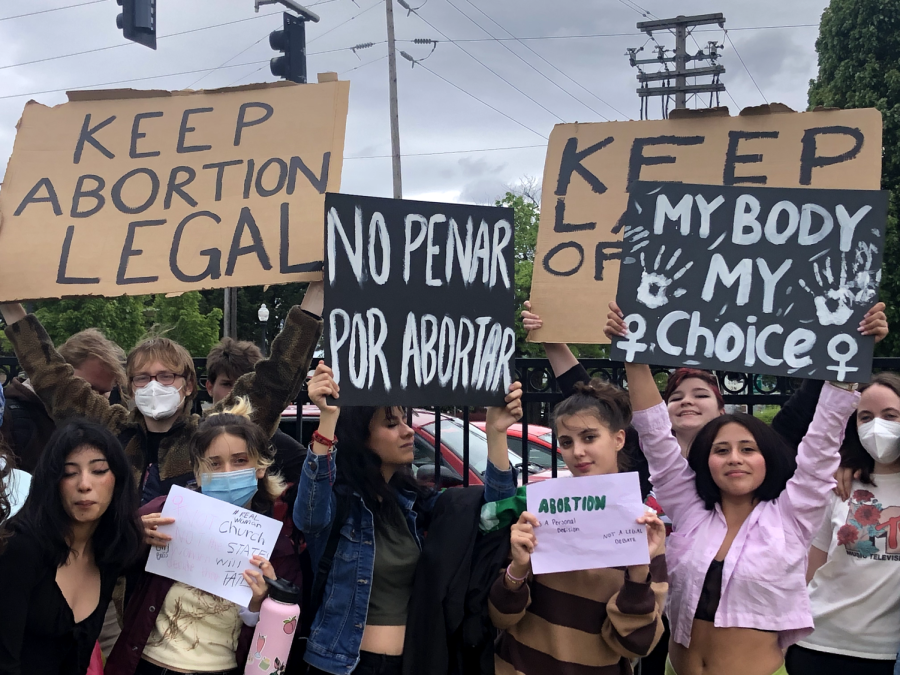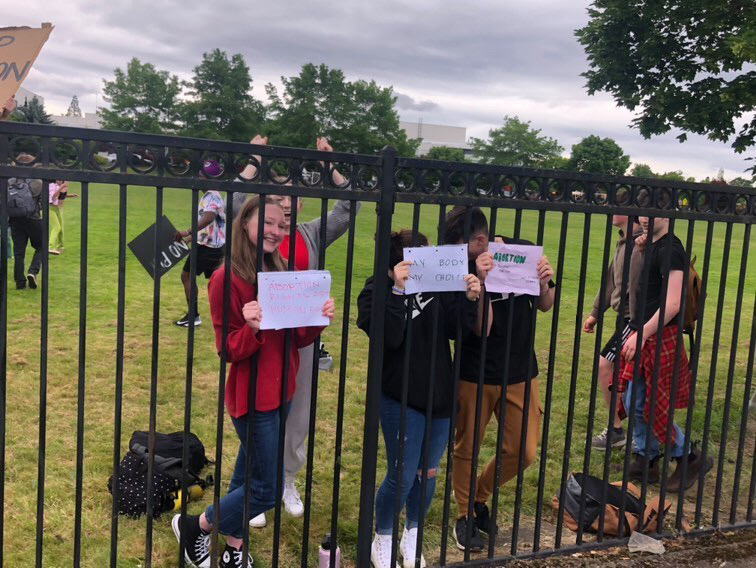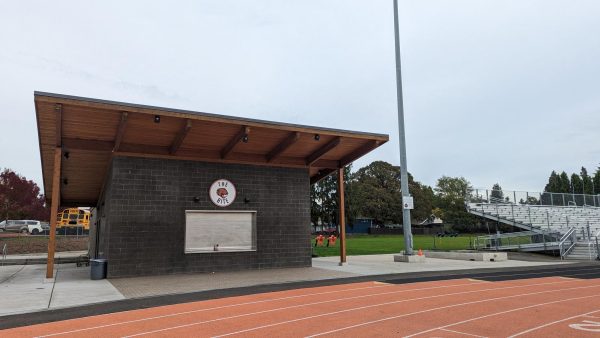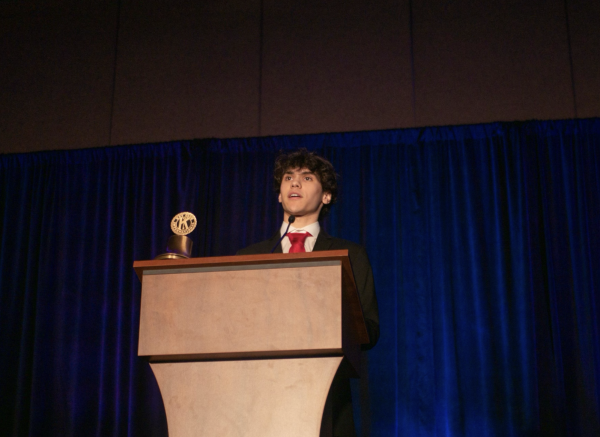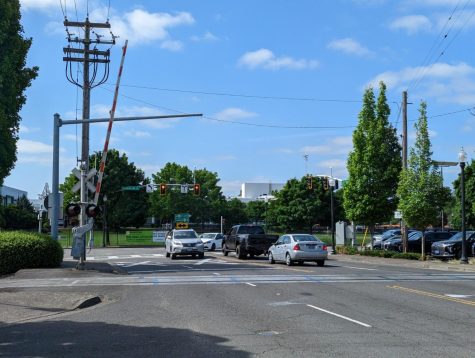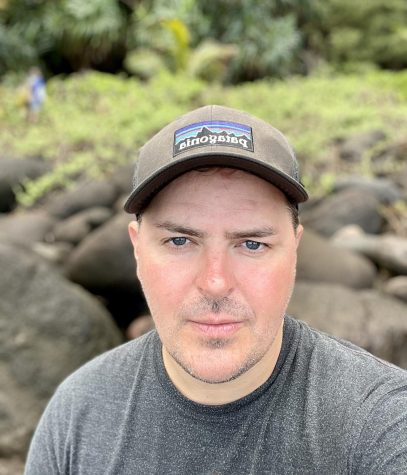Beaverton students gather to support abortion rights
Students gather on the Merle Davies’ field to protest the leak of a supreme court draft opinion overturning Roe v. Wade.
On June 3, during Beaver Lodge, the chants spread like wildfire, growing rampantly and unafraid to tear down anything in their way. Cardboard signs were held up to the fence, and the supportive honking of cars passing by incited cheers and whoops, hoots and hollers.
The cause? A seemingly unstoppable group of students on the front lawns of Beaverton High protesting the recent news that the Supreme Court plans to overturn Roe v. Wade, according to a leak obtained by Politico.
The protest was organized by the Beaverton High’s Inter-feminism Club. President and founder of the club, Diana Garcia, recounted the story of how the club came to be.
“Here at school, I noticed that we don’t have menstrual products, and there’s a lot of slut-shaming, a lot of sexual assault, sexual harassment going around, and I thought, I need to do something to stop this,” she said. “I talked to all the teachers about all the issues I’ve seen around school, even around the community, and they said, ‘Diana, create a club.’”
She spoke about the lack of representation she saw in the feminist communities near her. “I noticed that women with disabilities, no one talks about it. Women from the LGBT community, no one talks about it, so I feel that it’s really important to bring all this up.”
Both Garcia and protest organizer Xzayva Brott shared their thoughts on the current political state of Roe v Wade.
“With Roe v. Wade being up for overturn this month, we really wanted to show our support for people with uteruses, people who need sexual healthcare that can’t get it,” said Brott. “This is healthcare, and I don’t want that taken away from me.”
Not only is it healthcare, but many students, including protester Setsuko Sloan, say the abortion law goes beyond that.
“It is a need, a women’s right, and if you take this away it won’t stop abortions, it will just make it so much more dangerous,” said Sloan.
Roe v. Wade was a landmark Supreme Court case decided in 1973. In short, it keeps first-trimester abortions legal in all states in the US. The case involves Jane Roe, a pseudonym for Norma McCorvey, and Henry Wade, district attorney of Dallas County, Texas, where Roe resided. In that county, the current law was that abortion was only allowed when a woman’s life was in danger.
Roe was a single 21-year-old woman seeking an abortion, though the birth would not put her in danger. She decided to sue for the right to terminate her pregnancy. She won the case on two major fronts, with an emphasis on the vagueness of the law.
Firstly, the law infringed on the Ninth Amendment of the U.S. Constitution. The Ninth Amendment exists to protect the rights of citizens that are not listed in other parts of the Constitution. This includes a right to privacy, and Roe’s attorneys argued that this extended to a woman’s right to bear children.
Secondly, Roe’s team argued that blocking access to abortions also infringes Fourteenth Amendment rights, expressing that no state can abridge a citizen’s fundamental rights without due process of law. They also said the laws infringed citizens’ First, Fourth, and Fifth Amendment rights.
Recently, a Supreme Court case argued in December 2021, Dobbs v. Jackson Women’s Health Organization, is challenging the rulings of Roe v Wade and another abortion court case—1992’s Planned Parenthood V Casey.
In 2018, Mississippi passed the “Gestational Age Act,” prohibiting all abortions with limited exceptions after fifteen weeks. The only licensed abortion facility in Mississippi, Jackson Women’s Health Organization, filed a federal lawsuit against this law.
Roe v. Wade was built on a precedent to a pregnant person’s privacy. Planned Parenthood v. Casey was built on a precedent to bodily autonomy. But this case’s question is on the basis of abortion itself. The hot question in the court: at fifteen weeks, is the fetus viable?
On May 2, 2022, political media organization Politico released a draft of a majority opinion that circulated among supreme court justices in February 2022. The opinion would overturn Roe and Casey, stating that abortion is not a constitutionally protected right. It would allow states to set their own restrictions on abortion under the Tenth Amendment, which gives states whatever powers are not mentioned in the Constitution. However, this opinion has not been finalized, and therefore Roe has not yet been overturned. But what happens if the court finalizes this decision?
If Roe v. Wade is overturned, abortion access in many states will be restricted partially or entirely. 13 states have “trigger laws” put in place that will immediately ban abortion once Roe is overturned. This will force pregnant people to carry their pregnancies to term unless they can travel to a state with abortion protections still in place, an option inaccessible to many. Low-income Americans may not be able to afford to travel to another state, and will likely obtain other methods of abortion. After the passing of Texas’s fetal heartbeat bill, abortion rates only decreased by ten percent, according to New York Times reporting.
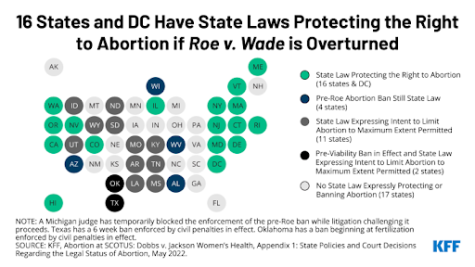
Many activists are also worried about what overturning Roe could mean for other previously established Supreme Court Cases. While this leaked opinion could create a sudden change in rights on abortions, it also opens pathways to overturn other laws based on the Fourteenth Amendment like Roe v. Wade that are not specifically mentioned in the Constitution. Protections for gay marriage (Obergefell v. Hodges, 2015) and use of contraception by married couples (Griswold v. Connecticut, 1965) could be at risk.
So, is Roe v. Wade getting overturned? Since there has been no official Supreme Court decision, it isn’t clear. But what is clear is the Inter-feminist Club’s support for women’s rights
“Abortion becoming illegalized is way more dangerous,” said Brott. “Millions of people with uteruses will die from botched abortions. We’ve seen it in the past, and we’ve seen it in other countries.”
According to the National Library of Medicine, approximately 42 million people with unintended pregnancies choose to obtain abortions each year internationally. Nearly half of these procedures—20 million—are unsafe.
Some 68,000 people die of unsafe abortion annually, making it one of the leading causes of maternal mortality (13%). Of those who survive unsafe abortion, 5 million will suffer long-term health complications. Those interested in helping the cause can donate to the National Abortion Federation, speak up about abortion access, and stay informed.
“I think, before I entered this feminist club I wasn’t aware of a lot of the issues that are going on,” said a protester. “I think it’s really important that we’re all aware of what is going on.”
The Inter-feminist Club meets during the last Beaver Lodge of the week and posts updates on their Instagram, @feminist_club.bhs.

Hannah is a senior at Beaverton. She edits articles and is a co-host on the work-in-progress Hummer podcast, The Beaver Buzz. In her spare time, she enjoys...

